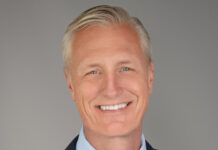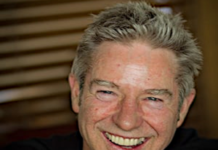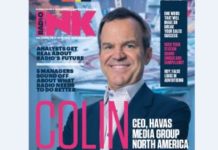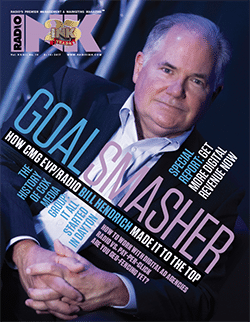
By Editor-in-Chief Ed Ryan
In July of 2015, Bill Hendrich — who was VP/GM of Cox Media Group’s Jacksonville radio stations at the time — was named CMG’s executive VP of radio and CMG Research. He was promoted to the top radio spot in the company after Kim Guthrie was catapulted to EVP for CMG’s National Ad Platforms and president of CoxReps. (In January 2017 Guthrie would be promoted to president of Cox Media Group following the retirement of Bill Hoffman.)
Bill Hendrich didn’t plan to be in radio when he started his career. In his early 20s, he was running a travel agency in Mobile, AL, and the local radio stations would call on him to sell him advertising. He got to know the program director at WKSJ in Mobile, which led to Hendrich’s working with the station on listener trips. He would accompany the morning show host, the GM, and listeners and act as the tour guide in places like Las Vegas and Mexico.
One day Hendrich stopped by the station’s new offices to take the boss to lunch, and the boss said to him, “This is where the new promotions director will be. We’re hiring someone new this afternoon.” Hendrich wanted that job. They went to have lunch, he was offered the job, and he took it. In that sense, his getting into radio was a fluke; Hendrich says, “My start in radio came by total timing.”
After only eight months, Hendrich moved into sales. “At the time it was the most natural thing to do,” he says. “I can think in 60-second commercials. I can think in promotions, and I could connect everything.” After a year, he was the sales manager. Hendrich says that job went very well, but also led to a real mistake: He put himself on a career path that wasn’t right for him.
“I let my ego get ahead of myself, of what I thought I needed to do,” he says. “I was modeling a boss I had at the time who was a GM by 28. I decided I was going to do the same.”
So, at 28 years of age, Hendrich convinced Pat Shaughnessy, who owned WAVH-FM in Mobile, that he was the right person to run the station. At the time, WAVH was in need of a format flip, new studios, new space for those new studios, and a new sales team. Shaughnessy tells us why he chose Hendrich for the job: “Because he was a native of Mobile, had success in the market as a sales manager, made a great first impression, was intelligent, and had a good sense of humor. He was also married to a lovely woman, Helen, and was a family man.”
Hendrich says getting that job was probably the greatest sale he ever made — and the worst. He was in over his head, and the job didn’t last long. But Shaughnessy says it ended well between the two of them. “WAVH was for all intents and purposes a startup,” he says. “Bill had a multitude of priorities that extended far beyond the normal duties of running a radio station. So while sales were way up, I had a bank loan that was two points above prime, or 16 percent, and I needed more revenue, which frustrated both of us, and we regretfully parted company. Bill and I have remained good friends because we’ve always liked and respected each other, and I’m very proud of his accomplishments and rise to one of the best in the industry.”
Hendrich was lucky enough to get his old job back as GSM at WKSJ, where he stayed for three more years — and learned to pace himself. After he sent out his resume and got a call from Dick Ferguson, NewCity Communications in Orlando was his next stop. “When we recruited Bill to the NewCity team in 1989, we were highly confident we’d made a smart move,” Ferguson says. “He didn’t disappoint, exceeding our expectations at K92FM as local sales manager, then heading up sales at all our high-performing Orlando radio stations, and eventually running the cluster as VP/GM. His solid track record of hard work, great people skills, and knowing and loving the radio business is the reason he’s running one of the best radio groups anywhere today. He gets the simple truth that finding the best people, supporting and nurturing them, and celebrating their successes brings the greatest rewards.”
Bill Hendrich is very much into goal-setting. After arriving in Orlando as the local sales manager, he set a goal to be the GSM by the end of 1989. He accomplished that, and had his eyes on the GM chair next. “I knew I wanted to be a GM,” he says. “I try to convince my kids that you have to set goals. You’ll find with today’s new generation, many are gun-shy about setting goals. I have copies of my written goals back to 1991. It was always ‘I am going to be a GM.’ I understood who my competitors were internally and externally, but I wanted to know what I had to do to be a no-brainer to be a GM.”
Hendrich got close to resigning from NewCity when it seemed clear there were no opportunities to advance. He was talked out of resigning by one of NewCity’s founders, who told him he had a great future. “I really respected him,” Hendrich says, “and I guess at that point, you are just looking for affirmation that there is a future.”
A few months later, Cox bought NewCity and Hendrich was made the GM of WDBO and K92FM. He says, “Somebody stuck their nose into my life and helped me make a decision that kept me moving down a good path.”
Orlando was a booming market in 1989, and Hendrich was loving life. He says that when he got to Orlando, Miller Kaplan reported the market’s revenue at $48 million. When he left, the figure was $130 million. He stayed in that position for nearly 10 years. Then it was on to Jacksonville, where he would run the Cox properties for about nine years before getting the call to run all of radio in 2015.
Radio Ink: Tell us about the call you got to run the radio division.
Hendrich: We have this service called TelePresence that does video phone calls. I had a meeting set with Kim to follow up on a document on a leadership meeting a couple of weeks before. It was my observations from that meeting, and everything I thought we ought to do in the radio division to adapt, grow, evolve, and move forward. I sent it to her and set up a conference call to talk about it, and basically tell my boss what she ought to do.
The morning of the call, I saw in my e-mail that Bill Hoffman had accepted the invitation to be on the call and I thought, “Why is he on this call?” I dial in, and it’s Bill Hoffman, with Kim sitting right behind him, and he starts talking about different changes we’re going to make in the company. He spends five minutes talking about a change we made with our national rep firm and that [CoxReps President] Jim Monahan was retiring.
He goes on and on about the rep firm in New York City. I’m thinking, “Helen will never go to NYC, please don’t tell me I’m going to NYC.” And I don’t know how to run a rep firm. Then he said, “Kim is going to New York to run the rep firm, and we want you to run the radio group.” A look of relief came across my face, and I’m trying to make eye contact with Kim. It was a cool thing; I was given the opportunity to run the radio group.
Radio Ink: Was that on your goal sheet? 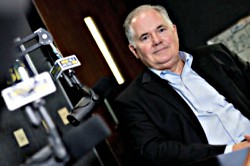
Hendrich: No — that is a great question. The way CMG was set up, there were a lot of regional vice presidents, and I was not one of them. Kim Guthrie was one, Rich Reis, Ben Reed, and Jay O’Connor. All of them were in radio, and they were all regional VPs, and with the exception of Rich, they were all younger than me. I thought there wouldn’t be an opportunity for me.
The job I had in Jacksonville was a great job. I loved the job and the city. Helen and I talked about where we would retire and we thought, “Why not Neptune Beach?” so we bought a lot there. If I had stayed in that job for the next several years of my career, I would have been happy.
Jay moved to TV in Seattle, and I thought that was interesting. Things shifted, and the job came out of nowhere. I didn’t expect that to happen and was pleased that it did. I thought Kim was going to be in the job running radio for a long time. Then Bill Hoffman decided to promote Kim Guthrie, and that created an opening here for me.
Radio Ink: What do you think it is about you that enabled them to consider you and put you in that position?
Hendrich: I’ve always had the ability to connect with a wide variety of people. I remember in high school, being aware I could run with many different groups of people, any cliches, I could fit in. I easily and naturally moved into leadership roles. I was VP of my fraternity my sophomore year in college. People were comfortable with me; it wasn’t like “Who does he think he is?”
I’m a planner and executer. It’s not that I think, think, think and never do. I like to know my priorities, have a plan, and execute. I’m a very good communicator with the people I work with. We set priorities, and it’s my job to create an environment where talented people can excel. If I do that right, they will allow me to be their partner in helping them excel and grow their career.
Developing people and growing talent was the lure of NewCity. Cox did it even bigger. I gravitated to understanding the talent themes and embracing them, whether it’s in sales or leadership, and helping people to grow and be their best. If you talk to others, they would say I’m fully committed to helping others grow.
I challenge them hard. That’s my job. If I care about them as business professionals, as a coach, friend, developer, then I need to help them be uncomfortable with their own growth. Most often, be their partner and advocate. You get promoted because the people who work with you say good things about you; they are your best PR. I think I have had great working relationships with the people both in Orlando and Jacksonville, and they have complimented me, and that has emanated up in the company.
Radio Ink: When you were a GM at 28, how did you know things were not going to work out?
Hendrich: I was ill-equipped to select a format, and why Pat Shaughnessy let me is beyond me. I did not come from programming, so I didn’t know that I didn’t get a whole lot of help. I didn’t think the format was right, I was hiring on-air personalities, which is something I had never done before, and we took an Easy Listening station that was in a basement of a downtown office building, turned it off, and at 28, I negotiated and rented new office space, built out studios, and hired an entirely new staff.
We were trying to operate in Mobile and Pensacola, so I had a sales team in both. I hired a sales leader. I was ill-equipped to hire a sales leader. What I have learned from NewCity and Cox about talent would’ve been a huge help back then. It was just not working, there’s no question about it. There was nowhere else to look to blame than the leader. That was me. It’s one of those things you know.
You also know, if you’re paying attention, the boss can’t allow this to go on much longer — he’s going to make a change, so I might as well be open and honest with him. He’s a good guy. We had a good relationship. I was proven correct when he did not argue with me to keep me in the job.
I called Pat, who is a friend to this day, and said, “I think you are going to fire me sooner rather than later, and my old job is open and I want to give you a call to see if I should take that.” And he agreed I should. It was the most delicate firing you will ever get.
Radio Ink: Do you think most people should go through an experience like that?
Hendrich: The greatest learning experience of my career, no doubt about it. There’s an article I came across that I share with everyone called “The Struggle.” It talks about a man seeing a cocoon, and he clips it and brings it home and puts it under a warm light, and he wants to see this beautiful butterfly emerge.
It starts rocking and pecking a hole, and then he watches this violent struggle for the butterfly to get out of the cocoon. And he decides to help it and snips a hole to make it easier, and what gets out is a bug that can’t fly because its wings are shriveled up. The struggle through the small hole is what pushes the fluid into the wings that allows the butterfly to fly.
I’ve always applied that to myself. That struggle taught me so many things, but most importantly, it taught me about being aware of who I am and what my time frame is. Absolutely invaluable for the way I’ve made decisions for myself and my organization. I share that with everybody who’s working with a person on their team who is struggling and having a hard time. It is going to lead to good times if you learn from the experience.
Radio Ink: What is your definition of the perfect market manager?
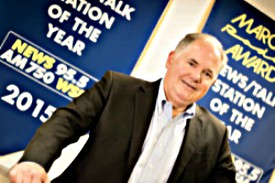 Hendrich: This person has to be committed and believe in the value of talent. When you talk to anyone at CMG, you will hear talent come up over and over again as a critical part of our success. They can’t just fill seats; they have to find the absolute best people they can. The great leaders love to be around talent, and seek it out.
Hendrich: This person has to be committed and believe in the value of talent. When you talk to anyone at CMG, you will hear talent come up over and over again as a critical part of our success. They can’t just fill seats; they have to find the absolute best people they can. The great leaders love to be around talent, and seek it out.
They have to care passionately about helping the team members grow to the highest potential they can achieve. It’s one thing to have talent, but if you don’t nurture it and coach it, then it’s wasted. The greatest market managers help people grow to levels they didn’t believe possible for themselves, and through that, their team members love working for them.
The quality of the work environment is important, and you’ll hear that from the top down. There is a vibe of excitement in the building that’s there because the market manager knows how to get people passionate about what they do. One of the great parts of my job is that I get to visit the markets. When you walk in, you can feel that excitement, a buzz running through the building.
They also have the discipline to plan and execute on their priorities. They help sales managers, programming, the business office establish priorities for their job. They have the discipline to do that themselves, but also hold others accountable.
And you can’t ignore that the great market managers deliver results. It’s very important to them. We have managers that I have to talk down sometimes when things aren’t going the way they want them. They are passionate about their drive to deliver results, and you have to love that. You don’t have to worry about that individual. If they have talented people, and the discipline to plan and execute, a great environment, and driving results is important to them, you don’t lay awake at night wondering what are they going to do. You know they will get it done.
Finally, they have to have fun and be willing to laugh and enjoy themselves. We don’t want stiffs running things, because you can’t have a great work environment. We are in a fun business. I would contend great managers in any industry like to laugh and have fun. Just because you’re having fun does not mean you’re not holding people accountable and driving for success. A stern face is not the requirement to have success. If you put all those things together, you have a great leader.
Radio Ink: Why is CMG a great place to work?
Hendrich: It starts at the top of the company. Jim Kennedy, the chairman of the board at Cox Enterprises, the grandson of [company founder Ohio] Gov. Cox; John Dyer, our president and CEO; Alex Taylor, the great-grandson of Gov. Cox, our COO; Kim Guthrie, our president; president of Cox Communications Pat Esser; and president of Cox Automotive Sandy Schwartz. These are all great people who care passionately about the work environment.
If you get a chance to walk through our Dayton properties [see our profile on CMG Dayton on page 30], you will see quotes from Gov. Cox. We are a 120-year-old media company — quotes about people, talent, environment, and how you treat people. That got passed down through the company, and the leadership believes that.
You rise up through the organization based on your ability to create high-quality work environments, where employees are valued and yet you still drive results. When that starts from the top, and these guys are unbending in that commitment, then you are able to operate like that with the belief that they mean it, today and tomorrow and next year. The choices you make allow you to do that.
When you get down to Cox Media Group, kudos to Kim Guthrie; she’s a great leader. She has run the radio group before. She went out and got the experience running CoxReps, and now she has CMG. She believes in all the things I have talked about. She is funny and loves to have fun, but is still serious about getting the job done.
Kim has that skill that allows her to connect with people, and they like working on her team. We are not about beating the daylights out of people for results. We hire really talented people that we respect, and we are glad to have them on our team and in awe of what they can do.
We want to create an environment where those people can excel. That is the theme of the company. To grow in this company, you are expected to carry that forward because it’s important to the family members that that is how their business is run.
Radio Ink: CMG takes sales training very seriously.
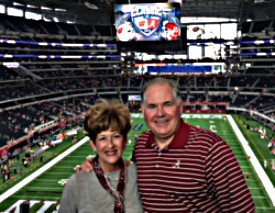
Hendrich: The company takes great pride in talent development, whether it’s at the field level, leadership level, or with high-potential employees. The investment Cox Enterprises makes in programs that will help people grow from all areas of the company is outstanding. It’s one of the benefits of being in a private company — they can choose to take their money and invest it in that.
I joined NewCity Communications in 1989, and we used CSS — the Center for Sales Strategy. We still work with CSS today. It’s that important to me. We’ve had a relationship since the mid-’80s, because it’s about sales training and the culture of who our company is.
CSS is about understanding the customer, identifying their needs, and finding a way to satisfy those needs. That’s no different than understanding the listener and what they want in a radio station. CSS helps pound home the culture of who we are.
CSS is where we all learned about talent themes and knowing that top salespeople have tremendous work intensity, persuasion skills, and all the different skills to create a great seller. It gives us a common language, key accounts, target accounts, individual focus meetings, etc. It’s equally about the culture of who we are: a company that starts with talent — and we want to develop that talent and give them the resources to grow. It is very important.
Radio Ink: Do you think the radio industry is in a good place these days?
Hendrich: I think it’s in a great place. It still has challenges, like any other industry. I look at the sales opportunities for radio and think about the digital disruption that hit newspapers. It took money that was already earmarked for newspaper, that radio sellers could never get, and threw it into a digital pool.
Digital disruption hit TV as well. It took all that money earmarked for TV and threw it into the digital pool. Both of those industries have always gotten more money than radio. Now a big chunk of their money has gone into a digital pool.
There’s no sales organization more suited to sell integrated marketing campaigns using spot, digital, events, and other things than local radio sales teams. We have more money available to us now than ever before. If you think about our top performers in this industry, in sales, they are selling integrated campaigns. They are touching more money than anyone has in our business. There is a whole group of salespeople that will look back on these times and say those were the good old days, because there’s so much to get and they are going out and doing it. We have to be willing to evolve and transform our business.
On the content side, audio is exploding, and we have challenges we did not have before. We used to say there’s the cassette player, CD player, 8-track. These new challenges are different because they ride on the person’s mobile phone, they can be on the dashboard of the car. They are very accessible. Interest in quality audio is at a peak.
There are so many opportunities, whether it be with a streaming company or good old stable radio. Ninety-two to 93 percent of Americans still interact with radio in any given week. When you think about that number, it comes down to how well we are executing our products. Are we delivering something the audience wants to hear?
I read a book years ago by a guy who was the head of Scandinavian Airlines [Jan Carlzon], called Moments of Truth. That stuck with me. When you carry that thought over to audio, and you realize the opportunity we have, that someone in a car is listening to your radio station, that is a moment of truth. They believe by putting your station on, you’re going to make their life better in that moment by what you’re doing. These same people believe if they go to a concert you’re putting on, for that evening, their life will be better. They have so many other choices, but they believe what we’re doing will make their life better.
If we deliver on that, they will tolerate some commercials. It’s part of the equation. If we deliver great local content that connects with them, we will continue to win those moments of truth and we will be around for a long time. It’s incumbent upon us, the industry, to deliver quality product. If we don’t, there are other good products, and they will go find them, and once they build a habit, they will stick with those. Shame on us if we let that go.
Radio Ink: So does radio play too many commercials?
Hendrich: Any number of commercials is too many to a picky listener, so yes, but I would like to see a good competitive environment where there are fewer commercial minutes played on the radio, absolutely. We have competitors that are able to play no commercials, or very few, in the business model they have. That’s not the competitive landscape we have had before, but it’s a very difficult thing to get to, based on the whole state of radio right now.
Radio Ink: Why has radio been unable to grow revenue?
Hendrich: I have focused on this within our own company; I will project it out to the rest of the industry. Within Cox Media Group, every week we have phenomenal examples of business development on a local basis. New accounts who are buying spot and digital, integrated campaigns. The level of new business development is great.
When you look at national, Katz has an organization dedicated to delivering new business. We got an order from Katz we worked together on, and it delivered a quarter million dollars of new business. That was done because people worked together to develop the new business. So business growth is happening.
Unfortunately, attrition is happening at a rate greater than we have ever experienced. Businesses are shifting their money around into that digital pool, and so for every two steps forward you take, you might take two or 2 1/2 steps back with a client that doesn’t come back to radio in a way they have before.
When you look at what happens in telcom, these guys either choose to be in massive competition and spend like crazy, or they all take a breather. You can’t replace all that money if they take a quarter off, even if you are doing new business development.
There is a shift within organizations like ours. You have local sellers who, just five years ago, only had spot, so you got every spot dollar you could possibly get. Now they have the ability to sell really good digital solutions, along with spot solutions. So we are shifting some of that money to digital ourselves.
It’s about seeking the right balance of what a great local media sales organization will be in the future. In companies like ours, great media sales organizations of the future will still sell traditional media but will also sell digital, and over time there will be a new definition of what winning is, and it will incorporate both spot and digital.
Radio Ink: How are the economies doing in the markets where you operate?
Hendrich: Sales are going well, and then I can find the one place that something weird happens and sales are not going well there. We have markets that are flourishing and those that are holding their own. We don’t have any that are tanking.
Tulsa is a bad market this year — not just our properties; that market has some odd shift going on dollar-wise. Every other market is this basic fight. It can be a horrendous month followed by two good months. There’s no sequence to how it’s happening. June turned out to be a pretty good month, but who knows what will happen in the next few months? Business comes in later now, and national is making itself up in months like it has never done before. You can go into a month with national down 20 percent and finish almost flat. It never used to happen like that.
Radio Ink: What would you like to see the industry do better right now?
Hendrich: Get much better at marketing ourselves to the creative directors, planners, and media buyers in the major media markets at the major agencies. For the most part, they don’t live the life of the normal radio listener. If you think of a creative director, a buyer in NYC, who lives outside the city and rides a train, who puts in earbuds but can’t get the radio, their listening experience to our medium is different than someone living in Wichita or Jacksonville.
People see life through their own experiences. If they are not connecting to how radio works for them, they will project that out to a bigger universe. We need to fix that, talk to some folks at agencies. I had dinner with Ed Gorman from Carat. He’s a passionate believer in radio, but he listens to radio. We talked about the stations he listens to.
We have to do a better job telling our story so they connect with what the American public experiences with radio, not necessarily what they do. It’s not that they are bad; they are living a different style of media consumption, and that does not reflect the rest of the country.
Radio Ink: Who should be doing more of that?
Hendrich: Two places. The RAB is certainly the organization to do it. Erica Farber has the team in place, and she has the passion to do it. It also has to come from the heads of the radio companies. They must get together and say, “We are going to do this.”
Right now there are some competing agendas out there on that. There are people making sure their business is OK, and they aren’t going to be able to give the time to do it. We have internal problems among groups. The willingness and belief is there, but I don’t know how good we are at getting everybody on the same page.
I think some groups would say they are doing a great job on their own, telling the story of radio. But the story has to be a unified story about the industry from the industry. We are not doing that well.
Radio Ink: Is the debt issue with the two major companies holding radio back?
Hendrich: It impacts radio in two ways. The companies are very big; therefore, to the world outside radio, they represent radio. If they’re having debt issues and constantly in the news because of those debt issues, how does it not translate over that everybody thinks radio is in trouble? You will hear many different group heads argue that in fact radio is still a flourishing business, but that overshadows it.
The second part is how you choose to operate your properties when you have big debt issues. There has to be a keen focus on driving results and revenue because you’re trying to accomplish something in that debt arena and people are holding you to the fire to deliver on it. At that point, sometimes choices like the amount of inventory aren’t what we would like to have happen in a perfect world.
But those are people waking up every day trying their best to do their job and deliver on numbers that they have to deliver on. They have to make tough choices. I don’t think everyone would make the same choices if they did not have that debt load, but that’s what they are living with, and they have to make choices.
Radio Ink: What goals have you set for yourself and CMG for the next three to five years?
Hendrich: My Jacksonville office has no windows, so I can put stuff on the wall. I’m looking at it now. For my goals: How do I understand listener data, big data, and how to use it to impact our advertising buys? Big data has finally found its way into radio advertising sales.
I know it’s possible now to take your digital audience and what you know from them and map it onto your over-the-air audience and truly provide addressable audiences for clients, and really understanding that — it’s a game-changer. If I can take our company there, in a year from now it’s a completely different sale. Ultimately, you are truly selling integrated campaigns.
I try to understand video. You hear that’s where the highest CPMs are. Radio has not figured out how to capitalize on video yet. And yet our stations do a lot of video, like at concerts, events, and performances. Podcasting is another area that fascinates me. I went to the podcasting summit in New York to listen to what’s going on in that space. I’m going to Podcast Movement. There’s something there.
More and more, those people are becoming stars, and it’s similar to radio: There are a few superstars and a whole lot of mid-level players, and then there are some bad ones in each. But audiences are getting there, and once they figure out how to track listening to commercials in downloaded podcasts so that it can become attributable, and they can understand it, I think more money will flow into podcasting.
I believe there are a lot of people trying to figure that out. When they do, I want us to be there. We are in a learning phase. We are trying to figure it out and decide how we navigate there.
Radio Ink: What about growing the company?
Hendrich: What is growth for us? We, like anyone else, would like to have more great properties in great markets. There are not many available at a price that provides a good ROI, but we keep our eyes open. We won’t go big just to satisfy our ego. We will go big because there’s an opportunity for a great return on investment. We’re happy with our size if that makes the best sense. If getting larger makes the best sense and can deliver a great ROI, then we’ll do that.
One of the unique things about CMG, from our competitors in the radio space, is that we are a private company that’s in other businesses. Cox Automotive is a huge business, and Cox Communications is the third- or fourth-largest cable company in the U.S. So our request for capital, whether it be for TV, radio, newspaper — if it’s a big capital investment, it goes up to Cox Enterprises and gets weighed against investment opportunities in Cox Automotive, and they are expanding internationally.
We have to be able to show the ROI that makes what we want to do in CMG more attractive than what they can invest in in automotive or communications. For all of us in the company, we want Cox Enterprises to win. Our ego says we would like CMG to play a more significant role, but the company will move forward smartly. If we can deliver media opportunities that fit into that plan, they will take them. Let’s make the company great.
Radio Ink: You’ve had a very successful career so far. What’s the secret?
Hendrich: It doesn’t happen if you don’t have a wife and family that are extremely supportive of what you’re doing. My wife, Helen, has allowed me to be a radio station promotions director out at all hours, a salesperson who committed to getting into work before anyone else and staying after anyone else, a sales manager with the same work ethic, and a GM who did a lot of different things. I always engaged my family in work, but she allowed me to be me in the workplace.
Fortunately, she is an artist and likes to paint, which means she likes time alone. She allows me the time to travel and do this job. I have two great kids who understand who I am and what I do. That allows you to flourish in a role. It’s not just you that gets it done, it’s your family that gets it done.

